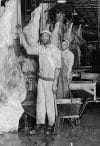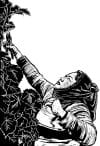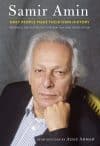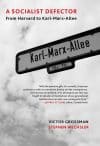Marxism

The world is burning, flooding, and politically exploding, to the point where it’s become abundantly clear that neoliberal feminism—the kind that aims to elect The First Woman President—will never be enough. In her vibrant, politically personal essay, Zillah Eisenstein asks us to consider what it would mean to thread “socialism” to feminism; then, what it would mean to thread “abolitionism” to socialist feminism. Finally, she asks all of us, especially white women, to consider what it would mean to risk everything to abolish white supremacy, to uproot the structural knot of sex, race, gender, and class growing from that imperial whiteness. | more…

The December 2018 issue of Monthly Review featured John Bellamy Foster and Brett Clark’s “Marx and Alienated Speciesism” and Christian Stache’s “On the Origins of Animalist Marxism: Rereading: Ted Benton and the Economic and Philosophic Manuscripts of 1844,” both of which take up Ted Benton’s work on animals and Marxism. Here Ted Benton offers a response to the critiques offered by Foster and Clark, and Stache. | more…

In this continuation of the exchange on “Marx and Alienated Speciesism” and “On the Origins of Animalist Marxism,” John Bellamy Foster and Brett Clark, and then Christian Stache, reply to Ted Benton. | more…

Tamás Krausz Interviewed by Róbert Nárai
In the 1960s, Georg Lukács—under the slogan Back to Marx!—called for a “renaissance” of Marxism within Eastern Europe. To understand the nature of this renaissance, we have to understand the many important questions that the Hungarian uprising of 1956 raised for the anti-Stalinist left inside Hungary and Eastern Europe more broadly. This interview looks at efforts to rethink the future of socialism from the Eastern European situation in the second half of the twentieth century, including the political lessons of 1968, the internal fight within the Hungarian Socialist Party, and the continued relevance of V. I. Lenin’s Marxism. | more…

This reprise of “The Debs Way”—the text of an address Leo Huberman delivered at the Debs Centennial Meeting held at the Fraternal Clubhouse in New York City on November 28, 1955—not only reminds us of the importance of Eugene V. Debs to the history of socialism in the United States, but also brings out some of the core beliefs of Huberman’s own approach to socialism. While today’s conditions are of course vastly different from when the address was delivered more than sixty years ago, the basic principles that Huberman derives from Debs remain relevant.

In the Notes from the Editors of the January 2019 issue of Monthly Review, the editors commented on a blog post by Michael Roberts on the term financialization. In the first part of this short exchange Roberts questions whether financialization is a meaningful and useful term, or simply a distraction from a comprehensive critique contemporary capitalism. | more…

A Reply to Michael Roberts
There has been a tendency within liberal analysis of financialization to place an emphasis on the trees, that is, the various speculative mechanisms, rather than the forest, or the growth of finance in relation to production. The reason for this stress on the trees rather than the forest is that, in contemporary capitalist ideology, financialization cannot be brought seriously into question since it is part of the entire architecture of accumulation. | more…

Germany is commonly perceived as a strong, dependable island amid a sea of gyrating European uncertainties, a down-to-earth, dependable ally in attempts by the better U.S. presidents to move the world forward as steadily as possible. For the past thirteen years, this view has been personified in the clear, undramatic words and deeds of Angela Merkel, Chancellor of Germany since 2005. Considerable doubts in this appraisal, with evidence that Germany, like every other country, has never been a monolith free of class conflict and other contradictions, are addressed in Oliver Nachtwey’s Germany’s Hidden Crisis: Social Decline in the Heart of Europe, out now from Verso Books. In describing West German, then all-German, developments from the end of the Second World War until the present, Nachtwey analyzes from the left, unafraid to utilize the ideas of Karl Marx as well as a host of more recent analysts of many shades. | more…

Your Socialism Depends on It
Revolting Prostitutes reminds readers that this struggle is at once bigger than any one sex worker’s immediate needs, but also must be precisely driven by these day-to-day needs. While this might at first seem contradictory, the book emphasizes how the collective workforce is constituted by individual workers with varied experiences, all of which are unique and valid. Narrative matters and, with Revolting Prostitutes, we are gifted one shaped by nuanced, considerate, care-informed members of the impacted working community. | more…

(Introduction by Aijaz Ahmad)
Radical political economist Samir Amin (1931–2018) left behind a cherished oeuvre of Marxist writings. Amin’s intellectual range—from economics to culture—was admirable, and his lessons remain essential. Monthly Review Press is honored to publish this volume, culled from the Monthly Review magazine, of ten of Samir Amin’s most significant essays written in the twenty-first century. The collection is introduced by Amin’s friend and comrade, the Marxist philosopher Aijaz Ahmad, who provides a comprehensive survey of Amin’s life and path-breaking work. Ahmad also offers a contextual focus by which to read such stunningly astute pieces as “Revolution or Decadence?” and “Contemporary Imperialism.” | more…

Why would an American girl-child, born into a good, Irish-Catholic family in the thick of the McCarthy era—a girl who, when she came of age, entered a convent—morph into an atheist, feminist, and Marxist? The answer is in Helena Sheehan’s fascinating account of her journey from her 1940s and 1950s beginnings, into the turbulent 1960s, when the Vietnam War, black power, and women’s liberation rocked her bedrock assumptions and prompted a volley of life-upending questions—questions shared by millions of young people of her generation. But, for Helena Sheehan, the increasingly radicalized answers deepened through the following decades. | more…

The circumstances that impelled Victor Grossman, a U.S. Army draftee stationed in Europe, to flee a military prison sentence were the icy pressures of the McCarthy Era. Grossman—a.k.a. Steve Wechsler, a committed leftist since his years at Harvard and, briefly, as a factory worker—left his barracks in Bavaria one August day in 1952, and, in a panic, swam across the Danube River from the Austrian U.S. Zone to the Soviet Zone. Fate—i.e., the Soviets—landed him in East Germany, officially the German Democratic Republic. There he remained, observer and participant, husband and father, as he watched the rise and successes, the travails, and the eventual demise of the GDR socialist experiment. | more…











